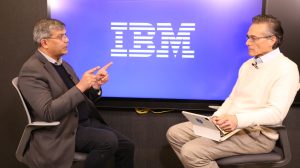 AI
AI
 AI
AI
 AI
AI
Artificial intelligence is flipping the script on AI-powered business operations — moving them far beyond basic automation to become the backbone of enterprise transformation.
As businesses face mounting pressure to evolve, they’re no longer content with minor efficiency gains; instead, they’re embracing AI to completely rethink how work gets done, from finance to customer service. But tapping into this potential isn’t just about plugging in new tech. It demands a bold shift in mindset, where data-driven insights, process reinvention and a willingness to challenge legacy systems drive real, scalable value, according to Tony Menezes (pictured), global managing partner of business process operations, IBM consulting, at IBM Corp.

IBM’s Tony Menezes talks to theCUBE about AI-powered business operations.
“One CFO basically told me, ‘You know more about my business than any other consultant I would pay millions of dollars. Just tell me what I know what you already know,’” Menezes said. “That’s where I think we have the opportunity to be really different in delivering our values for our customers.”
Menezes spoke with theCUBE’s Dave Vellante at the “AI-Powered Business Operations: Strategies for End-to-End Transformation” event, during an exclusive broadcast on theCUBE, SiliconANGLE Media’s livestreaming studio. They discussed how AI is transforming business operations from basic automation to data-driven process reinvention, enabling enterprises to achieve scalable growth and efficiency. (* Disclosure below.)
AI-driven business operations focus on transforming processes rather than simply relocating or automating them. Where outsourcing once prioritized cost-cutting through offshore labor, today’s enterprises expect partners to deliver measurable outcomes that drive growth. IBM embraces outcome-based, gain-sharing models, tying its compensation to the business value it creates — reflecting clients’ rising demand for shared risk and reward, Menezes noted.
“A lot of our commercial conversations we’re having with clients is now we’re putting our neck out to say we can deliver the outcome and we’ll get paid on percentage of that outcome to be delivered,” he explained. “That allows us to basically tell our clients what they can actually put up with us or we can put up with them to be able to get to those types of results.”
IBM’s confidence comes from decades of operational expertise and a broad client base across industries, allowing it to pinpoint where workflows can be reimagined. By combining this experience with access to clients’ operational data — whether from ERP, HRM or CRM systems — IBM identifies opportunities for meaningful improvements, from incremental automation to workflow adjustments or broader policy changes, according to Menezes.
“It does require us to be able to access the client data around that process and we’re working with our clients on how to extract that,” he said. “We recognize they’ve made significant investments in their core systems, whether it’s the ERP systems or the HRM systems or the CRM systems. We’re able to just leave those in place but extract the data and manipulate the data that it needed to facilitate that workflow and push that data back.”
The shift to AI-driven operations presents challenges, with many enterprises struggling to internalize what it truly means to rethink how work is done. This mindset shift often proves harder than the technology itself, demanding strong leadership and change management to move beyond isolated experiments. IBM addresses this by starting small — proving value in one area — then scaling successful models, helping clients overcome hesitation and embrace broader transformation, Menezes pointed out.
“Reimaging the way work gets done is a harder part of the discussion,” he said. “It’s an easier presentation or a sales pitch to make to a given client. It’s them internalizing it and getting it into their entire organization that is the harder yards to walk through. We need to be able to demonstrate that to our clients and how we can do so.”
Another key element in enabling growth is delivering a seamless digital experience — not just for customers, but for employees and suppliers as well. AI-powered business operations are increasingly expected to provide a consumer-grade user experience. Without this focus, enterprises risk falling back on outdated, labor-intensive processes.
“This work is now getting to be a lot more digital operations, and it’s critical that we actually have a consumer grade experience for any consumer of this service,” Menezes explained. “To me the consumer is the internal employee that’s doing work in the enterprise, it’s a supplier that supports that given enterprise, it’s even customers of that given enterprise.”
Finally, when it comes to deploying AI, businesses are navigating varying degrees of readiness, particularly regarding data privacy and cloud infrastructure. Sensitive data in areas such as finance and HR often remains on-premises, making hybrid cloud strategies essential. IBM is helping clients blend public and private environments, bringing AI capabilities to where the data resides, according to Menezes.
“Some of that content that’s product-centric or service-centric, obviously the clients are willing to let that be in the public cloud,” he said. “When it gets to the financial systems and the HR systems especially, there’s a lot of sensitivity to what can and cannot be used elsewhere. We are working with clients and actually bringing that in a hybrid way so that they can leverage the capabilities that’s out there.”
Here’s the complete video interview, part of SiliconANGLE’s and theCUBE’s coverage of the “AI-Powered Business Operations: Strategies for End-to-End Transformation” event:
Plus, don’t miss the event entire episode:
(* Disclosure: TheCUBE is a paid media partner for the “AI-Powered Business Operations: Strategies for End-to-End Transformation” event. Neither IBM Corp., the sponsor of theCUBE’s event coverage, nor other sponsors have editorial control over content on theCUBE or SiliconANGLE.)
Support our mission to keep content open and free by engaging with theCUBE community. Join theCUBE’s Alumni Trust Network, where technology leaders connect, share intelligence and create opportunities.
Founded by tech visionaries John Furrier and Dave Vellante, SiliconANGLE Media has built a dynamic ecosystem of industry-leading digital media brands that reach 15+ million elite tech professionals. Our new proprietary theCUBE AI Video Cloud is breaking ground in audience interaction, leveraging theCUBEai.com neural network to help technology companies make data-driven decisions and stay at the forefront of industry conversations.